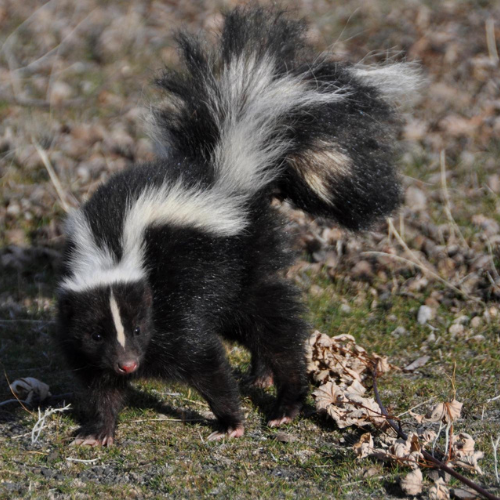Skunks are considered a pest species throughout the United States based primarily on their infamous odor sprayed as a defensive weapon. In addition to the threat of skunks spraying pets or interior areas of homes and businesses, they are also known for causing damage by digging in yards and causing structural damage when they nest inside buildings.
The common striped skunk can weigh up to ten pounds and is usually about two feet long. Their distinctive black coat and broad white striping quickly distinguish them from other wildlife species. Skunks are most active at night and breed in the early spring when they are most likely to look for interior nesting spaces. In addition to defensively spraying from their scent glands, they also discharge scents during their mating periods to identify their territory and attract mates.
Like other mammal wildlife species, skunks carry rabies and pose a significant infection risk for humans and pets, especially dogs. Skunks that appear during daytime hours and appear disoriented or partially paralyzed and are acting aggressive are more likely at risk of rabies infection. Skunks are also known to carry and transmit leptospirosis, a bacterial infection that is transmitted through skunk urine in soil or nesting areas.
Skunks typically avoid confrontation and don't normally spray unless they feel immediately threatened. They usually begin with a defensive posture that many mammals recognize and associate as a warning before they spray from their anal glands. Skunk spray is not only effective against predators because of its odor, but also because of its extremely irritating interaction with a predatory or domesticated animal’s mucous membrane. Skunk spray causes extreme nausea and temporary blindness in animals on contact. The chemicals found in skunk spray also interact with water, which is why washing pets or structural surfaces often only makes the notorious smell worse.
The responsible and most effective method of skunk control is professional trapping and removal. Professional live trapping minimizes the risk of spraying upon capture. Poisoning or trapping designed to kill or incapacitate skunks dramatically increases the chance that unwanted spraying occurs and is something that should not happen. Commercially available skunk repellents are often ineffective for do-it-yourself skunk control. Professional inspections and advice are needed to determine what, if any, chemical applications are useful or necessary. Many home remedies have been used for dealing with skunk odor after spraying has occurred. While some of these remedies can reduce odors, professional chemical treatments are generally needed to address cleaning affected areas while ensuring proper application. Pets that are directly sprayed by a skunk need veterinary treatment for clinical signs and need rabies monitoring and treatment when bitten.
In addition to live-trapping and removal, professional exclusion methods are effective in keeping skunks away from residential and commercial property and buildings. Skunks naturally tend to live and breed under decks, porches, and inside crawlspaces and basements. Exclusionary barriers are typically very effective in keeping skunks out of interior spaces. Tight control over garbage receptacles and other food sources are also important to skunk exclusion.
The pros at Veteran’s Pride Wildlife Control have over 25 years of experience providing professional and individualized wildlife control services for homeowners, businesses, and governmental entities throughout the St. Louis metropolitan and surrounding areas in Missouri and Illinois. Contact us today for an inspection for wildlife control services for your property.

